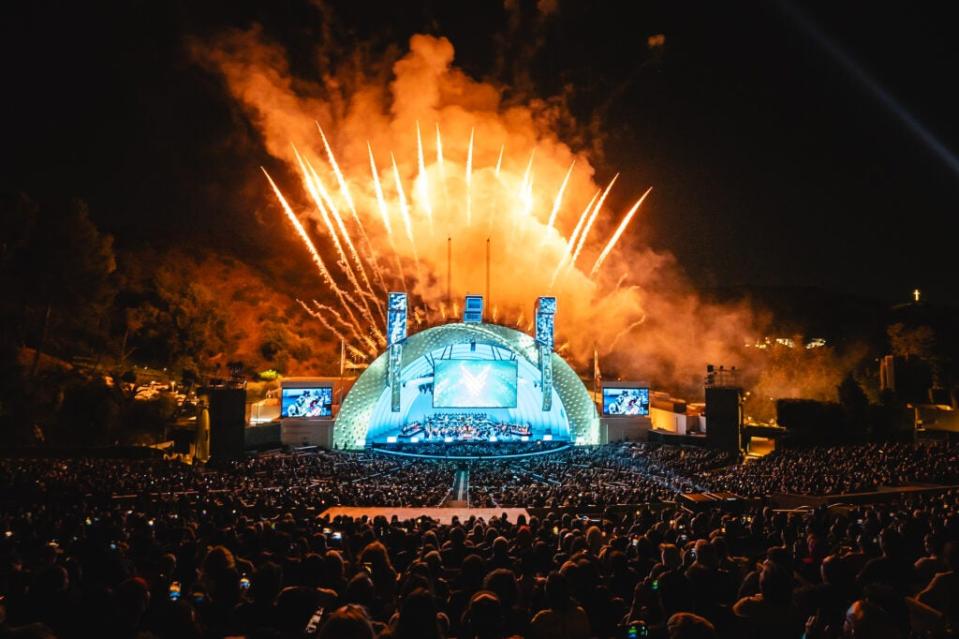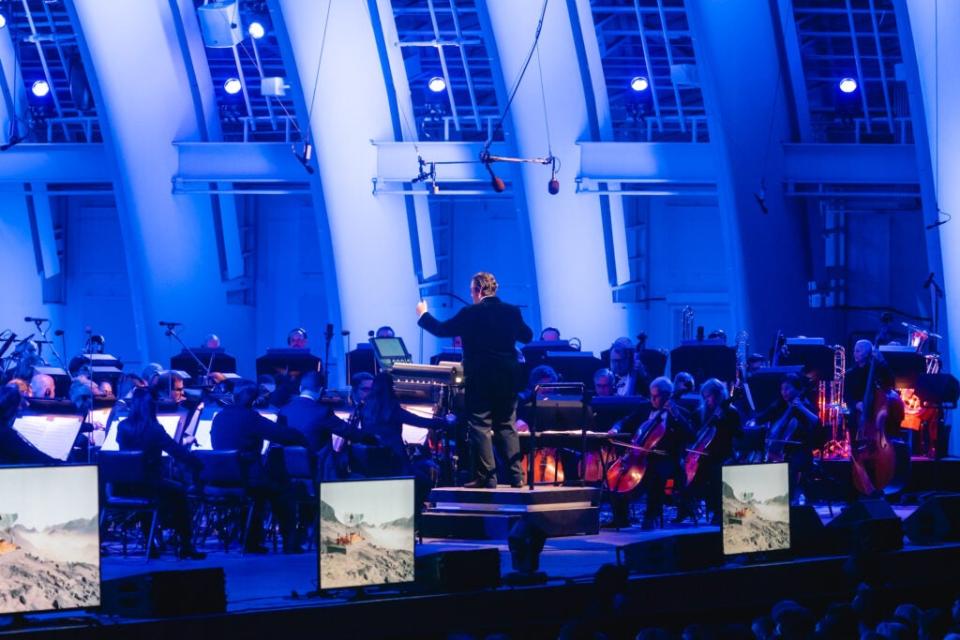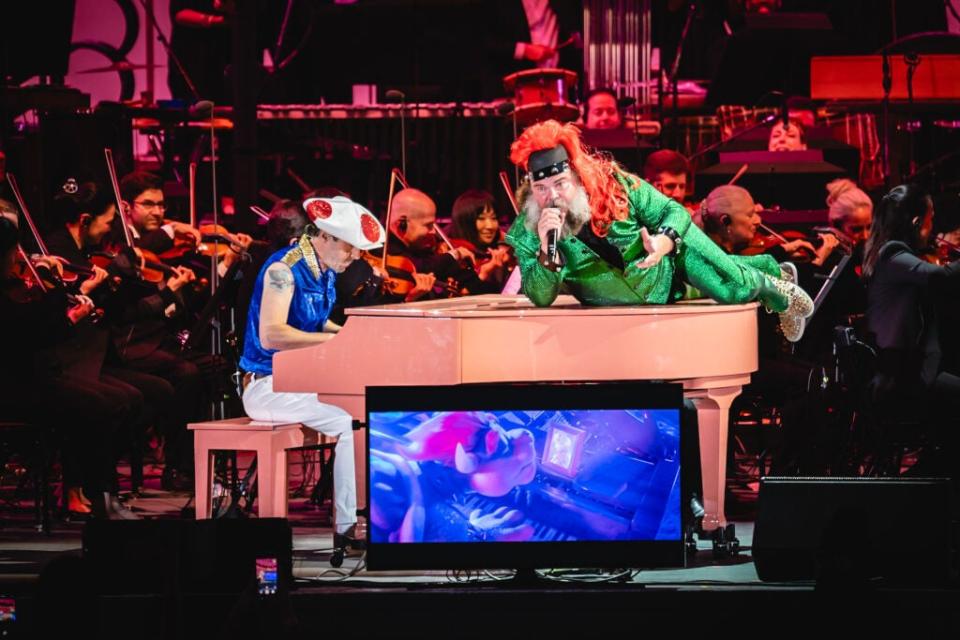Video Game Music Is Big Business – and Hollywood Is the Last to Score
- Oops!Something went wrong.Please try again later.
- Oops!Something went wrong.Please try again later.
- Oops!Something went wrong.Please try again later.
- Oops!Something went wrong.Please try again later.
- Oops!Something went wrong.Please try again later.
Sunday’s Game Awards 10–Year Concert took over the Hollywood Bowl, a venue with a 17,500-person capacity and a history of hosting musical talent such as Yo-Yo Ma and the Beatles. The concert was led by composer and conductor Lorne Balfe, featured an appearance by composer Gustavo Santaolalla, and spotlighted other music industry heavyweights. But even with an event on that scale taking place in the heart of the entertainment industry, it’s not yet universally clear that video game music has risen in prominence to rival the business merits and artistic sophistication of music for film or television.
“I look at it the same way as how people used to look at television compared to film, they used to look at it and kind of go, ‘It’s not of the same caliber’ — it’s nonsense,” Balfe said in a conversation with TheWrap.

“The storytelling and the visuals and the narratives in these games are up there with movies, and I think that certain generations do have a stigma because they feel that it’s just people sitting there in their bedroom playing. And — so what?”
Whether one’s sitting in a dark movie theater or a bedroom with a game console, the experience of ingesting a narrative on a screen is the same. And as far as Balfe was concerned, the quality of the content is the same as well.
Also Read:
How ‘Top Gun: Maverick’ Score Producer Mixed Hans Zimmer and Lady Gaga
Academy Award-winning composer and musician Gustavo Santaolalla had similar thoughts. He doesn’t consider himself artistically bound to any particular medium, so when “The Last of Us” creative director Neil Druckmann connected with him and discussed the 2013 game’s narrative focus and emphasis on storytelling, Santaolalla signed on, completely detached from whatever stigmas video game music work held at the time. He acknowledged those stigmas did exist for others.

Changing gaming music’s perception
Santaolalla gave an anecdote about his interactions with the creative director, stating that Druckmann recently told him that back during the early days of the original “The Last of Us” game, Druckmann’s people weren’t confident Santaolalla would be interested in a video game project. To note: Santaolalla composed not only the score for “The Last of Us,” but also its 2020 sequel and 2023 HBO series adaptation.
“I think that once Hollywood recognized the visibility and profitability of computer games, and that was in the early 2000s, this is where things start to grow faster and faster,” said composer Inon Zur (“Starfield,” “Fallout 4”). “I think that the two first companies that really recognized it were EA and Sony who connected themselves with Hollywood.”
Also Read:
‘Starfield’ Rockets Into the Top 10 PC Game Sellers List With Big Preorders | Chart
Santaolalla’s work on the “The Last of Us” franchise is proof of Zur’s reference to Sony connecting with Hollywood, as is Sony bringing on Henry Jackman to score “Uncharted 4.” And EA enlisted Balfe and his colleague Hans Zimmer, among other artists, to work on older titles such as “Crysis 2” as well as, more recently, “FIFA 19.”
Zur also pointed to movie tie-in games as projects that helped raise awareness of the medium, given the weight that came with sharing the names of major film franchises.

As for the entertainment industry’s stigma against game composition work, Zur said that’s more or less vanished within the past two years. There’s not quite perfect cultural parity between the gaming, TV, and film folks, with Hollywood projects still getting something of a pedestal, but negative connotations toward game work are rapidly disappearing.
Also Read:
‘Street Fighter 6’ Review: The Most Accessible Fighting Game in Years
Culture aside, all three composers noted resources, budgets, tools and opportunities weren’t an issue on blockbuster games compared to major film work. In other words, composing for games wasn’t a second-rate experience.
Zur, who’s worked on trailers for films such as “Avengers: Age of Ultron,” noted that the business optics of working on game trailers and film trailers were “pretty much the same,” the reason being that both mediums’ projects are being handled by many of the same trailer houses.
When asked if a blockbuster game like “FIFA 19” afforded him the same tools, access and resources as a major Hollywood film, Balfe responded in the affirmative.
The numbers don’t lie
“Game composing deals can seem less lucrative than film composing deals for example, especially when comparing music budgets for indie or AA games, but stand their ground when compared to music budgets between AAA games and blockbuster films, which can go from $400,000 and up depending on the composer’s pedigree and the production budget,” said Jeremi Valiquette, Zur’s current agent and the founder and president of 1E Avenue Music Agency.
“Five years ago a AAA production might have had development budgets of around $50-150 million, these days some of the biggest games have budgets of $200 million and above, and music budgets have adapted to this reality,” he continued.
When asked what a AAA blockbuster game might budget for a soundtrack, he said music budgets in that space tend to hover around $500,000 to $600,000, though it’s not unheard of for developers to spend more to license tracks or attract specific composers.
For context, according to music-publishing experts Todd and Jeff Brabec, a film composer can earn over $200,000 over five years from a standard film thanks to back-end royalties, putting game composers on par with these figures.
If we specifically look at mega-blockbuster films, composers have in the past been able to command $1 million-$1.5 million fees (the last official word on Danny Elfman’s fees, for example, is that he commanded around $1.5 million per film). To put a percentage on it, The Guardian noted Sam Raimi’s “Spider-Man 2” and similar films capped music at no more than 2% of the overall budget. Nix the blockbuster label and shrink a film to a midrange major release, and the music fee goes down to $500,000-$700,000. In tight economic times, these fees drop lower.
Compared against Valiquette’s budget ranges for game composers, there’s parity, even if the top brass of Hollywood’s music scene still make a bit more on films, such as Hans Zimmer (who’s done plenty of game work!).
“Some others will decide to invest more in the production and record their full score at Abbey Road Studios with the London Symphony Orchestra or London Philharmonic, or at the Warner Bros. scoring stage with the best Los Angelese musicians for the prestige it brings to the game’s soundtrack,” Valiquette added.
A tidal shift decades in the making
Valiquette also highlighted gaming’s rise to prominence, describing a timeline similar to what the composers noted. They all pointed out that in recent years, when games’ financial and artistic merits became too big to ignore, stigmas began evaporating.
“In the 2000s or even early 2010s, only those who came to be categorized as ‘game composers’ would show interest in scoring games, but for the past 10 years, Hollywood composer agencies have become aware of the money being generated by the game industry and have shown a lot more interest in getting in on game scoring and focus mostly on the few mega productions being developed per year,” said Valiquette.
Valiquette, an industry veteran who’s worked at Ubisoft and Warner Bros. Games Montreal, is one of a growing number of agents who champion game music. Like Valiquette, eagle-eyed talent scouters have seen the business value in this space for a long time, such as the late agent Bob Rice, who’s widely regarded as a pioneer in the gaming music space, having taken it seriously long before most others saw its potential.
“Bob was first and foremost a visionary,” said Zur. “He saw the potential in music for games at least 10 years before anybody else really saw it.”
Rice opened up Four Bars Intertainment in 1992 to elevate game music and the talent behind it. Though he ultimately sold Four Bars to COOL Music Group in 2013, his impact on the games industry lived on. He helped get major music talent, including Zur and Cris Velasco (“Darksiders,” “God of War”), in the business before it was known as a prized place to be. Decades later, it appears industries beyond gaming are finally realizing and accepting what he saw, a simple truth: That video game music is a big deal.
Also Read:
Bob Rice, Champion of Video Game Music and ‘Journey Escape’ Creator, Dies at 79

